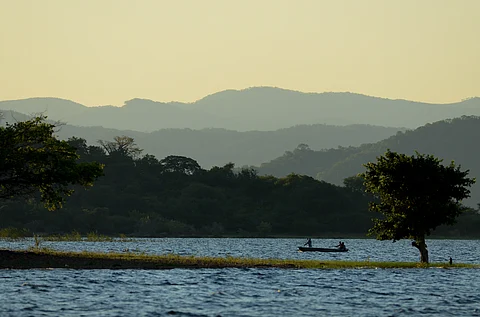

A fishing boat on Lake Kariba, the world's largest artificial lake, which lies on the border between Zambia and Zimbabwe.
Photo: Adobe Stock.
Zimbabwe is soon to introduce its first-ever fisheries and aquaculture bill, described as a "comprehensive and cohesive legislative framework" for the sustainable development of the sector, according to the Food and Agriculture Organization of the United Nations (FAO).
The draft legislation is backed by the FAO's global aquatic value chain development programme FISH4ACP, and has recently been approved by key stakeholders before it goes before Zimbabwe's parliament. According to the FAO, the bill is seen as "central to Zimbabwe’s goal of building a USD 1 billion fish economy by harnessing the full potential of its water resources to combat hunger and malnutrition".
“The bill provides a comprehensive and cohesive legislative framework which represents a critical turning point for Zimbabwe's fisheries and aquaculture sector," said Patrice Talla, FAO Subregional Coordinator for Southern Africa and Representative to Zimbabwe, in a press release announcing the news. "The development of the bill has been a collaborative effort, involving extensive multi-stakeholder consultations across the country,” she noted.
The nationwide consultation process made special efforts to involve women and young people, in close collaboration with Zimbabwe’s Office of the Attorney-General and legal experts from the FAO.
“This bill is a game-changer, streamlining regulations, promoting sustainable practices, and driving growth in the industry,” said Milton Makumbe, Director of the Fisheries and Aquaculture Resources Department at the Ministry of Lands, Agriculture, Fisheries, Water and Rural Development. “I am confident that we can unlock new opportunities for economic development, food security, and job creation.”
The effort forms part of a broader strategy led by FISH4ACP, an initiative of the Organization of African, Caribbean and Pacific States (OACPS), implemented by FAO with funding from the European Union and Germany’s Federal Ministry for Economic Cooperation and Development (BMZ).
In Zimbabwe, FISH4ACP has focused on strengthening the tilapia value chain as a strategy for transforming the sector. In 2022, the organisation conducted a value chain analysis which indicated the need for a strong policy and legal framework to unlock the sector’s potential.
Jobst von Kirchmann, EU Ambassador to Zimbabwe, described the new legislation, together with development of breeding centers and fingerling hubs, as "milestones" that "lay the groundwork for an inclusive and sustainable fish value chain that can unlock millions in added value, create decent jobs - especially for women and youth - and contribute meaningfully to national food security and economic resilience."
“With this new bill and a clear vision for 14,000 tonnes of farmed tilapia and USD 22 million in annual value by 2032, Zimbabwe is laying the foundations for a sustainable and inclusive blue economy," Kirchmann added.
“This bill can safeguard the future of Zimbabwe’s fish farmers,” said fish farmer Loraine Motsi. “It preserves the integrity of the supply chain from fingerlings to feed, enabling farmers to produce high-quality fish and build a thriving aquaculture industry that benefits our entire nation.”
According to FISH4ACP, Zimbabwe has a great deal of potential for aquaculture, based on its "abundant water resources and conducive water conditions", as stated in a country factsheet published by FAO/FISH4ACP.
Fish farming activity in the country mainly focuses on tilapia, producing around 5,000 tonnes a year with an estimated value of USD 13.7 million, almost 70% of which is exported to neighbouring countries, according to FAO figures.
Zimbabwe has a per capita fish consumption of just 2.4kg, compared with the regional average of 6kg, largely due to high market prices, suggesting "significant potential for increased consumption, including for tilapia, provided that production costs are brought down to reduce prices," FISH4ACP argues.
